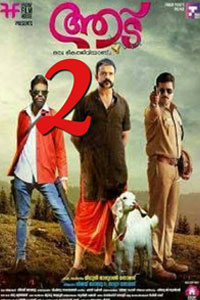Lohithadas has been in his best in the past, contributing fresh story lines to films that always captured the heart of the Malayalam viewer's. But recently this industry's most dependable writer-director has been keeping away from business for quite a time and even his comeback in Chakkaramuthu couldn't make any impressive watch. So for Naivedhyam, he has attempted a rehash of the best tried and tested formula in Malayalam, taking bits and pieces from many hit films like Sallapam, Ee Puzhayam Kadannu, Nandhanam and Kasthooriman. Any way the result is a film which comes with his own brand of narration, giving us an endearing watch, this Onam.
Naivedhyam is a simple film, revolving around simple characters. Yet, it works, partly because the story defies the regular stereotype, due to its super-efficient performances and partly due to the well-crafted screenplay and convincing storytelling.
The film's opening hastily sketches the life of Mohana Krishnan, an outspoken Brahmin guy who is presently into carpentry work to keep his family comprising of his widowed mother and sister. He is the son of C .K, a famous dramatist, who fought for the rights of writers. Even after his father's death, Mohana Krishnan managed to study all arts and crafts till his plus two, but as his family's prospects fell on his shoulders, he left his traditions to find better jobs to maintain his family intact. Forwarded by one of his father's friend lyricist Kaithapram, who happens to meet him in a composing session, Mohana Krishnan arrives at the Kovilakom, headed by Ramavarma Thampuram, a pious aged man who was a dear student of Chembai Vaidhya Natha Bhagavathar.
Mohana Krishnan was looking for a job at Kovilakom, but the financial position of the Tharavadu was not so bright that they cannot offer any job for him. But as the health of the elderly priest in the Tharavadu temple owned by the Kovilakam was declining, Ramavarma Thampuran deputes him to assist him at the temple. Although he doesn't know much about mantras and rituals, the old priest gives him necessary training and entrusts him with the rituals of the temple while keeping a supervisory role for himself.
As the Keezh Santhi (Assistant Priest) comes, the prospects of the temple brighten as he works day and night to keep the rituals of the temple, and to invite the people from the surroundings to the temple. The young priest very soon become the object of fancy of every one and grabs the attention of many young women, including the heroine Sathya Bhama, who is an orphan, the illegal daughter of a lady who committed suicide for her misdeeds. She and her grand mother live in a separate house away from their relatives, selling the Pappads that they make for a living.
Sathya Bhama also has her share of agonies as she is in constant threat from one of his cousins Surendran, a reckless goonda who is hell bound on marrying her. And when ever he comes to her house, she finds solace in the temple outskirts. As Mohana Krishan also stays in the temple, they starts meeting there on nights at a regular basis and eventually circumstances force them to fall in love. And as usual with every love stories, not everything is going in their favor, as they are caught red handed, from inside the temple.... Though the starting of the film is just about okay, it gains momentum after initial few reels. And with the sequences of monologues of Mohana Krishnan with the Deity Krishnan, the film climbs a steady lane, comfortably placed and paced. There's also an absence of comedians or sub tracks to test our patience, making for a different experience.
The debutant Vinoo Anand as Mohana Krishan towers over everyone else with a mind-blowing performance. He has guarded his family traditions with a wonderful and a fitting debut. It's rare for an actor to get such a difficult role in his very










Comments